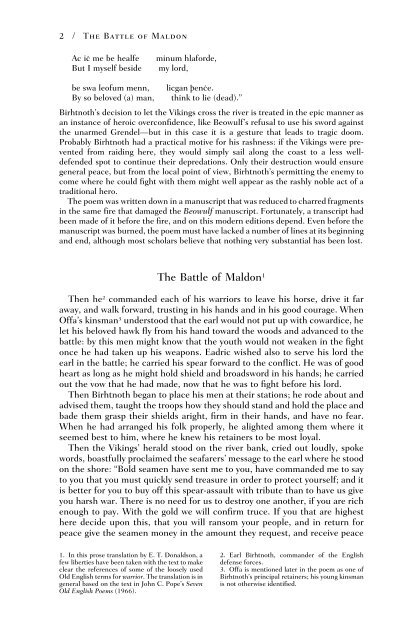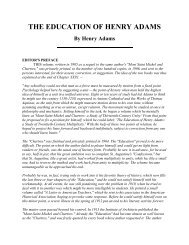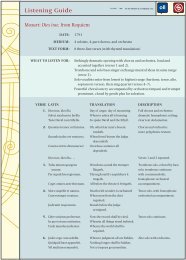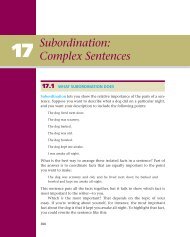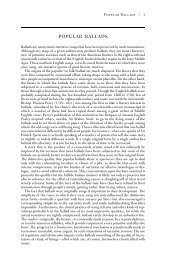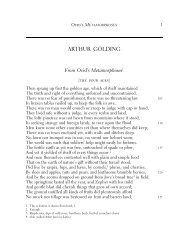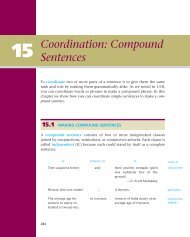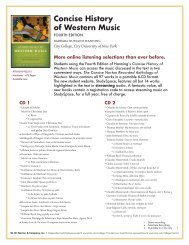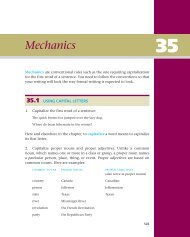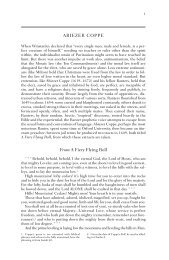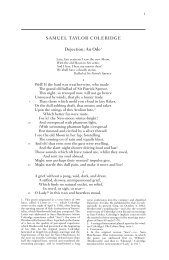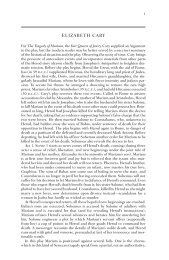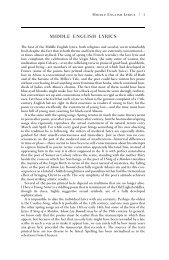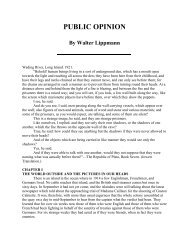THE BATTLE OF MALDON - WW Norton & Company
THE BATTLE OF MALDON - WW Norton & Company
THE BATTLE OF MALDON - WW Norton & Company
You also want an ePaper? Increase the reach of your titles
YUMPU automatically turns print PDFs into web optimized ePapers that Google loves.
2 / The Battle of Maldon<br />
Ac ic˙ me be healfe minum hlaforde,<br />
But I myself beside my lord,<br />
be swa leofum menn, licgan penc˙e.<br />
By so beloved (a) man, think to lie (dead).”<br />
Birhtnoth’s decision to let the Vikings cross the river is treated in the epic manner as<br />
an instance of heroic overconfidence, like Beowulf’s refusal to use his sword against<br />
the unarmed Grendel—but in this case it is a gesture that leads to tragic doom.<br />
Probably Birhtnoth had a practical motive for his rashness: if the Vikings were prevented<br />
from raiding here, they would simply sail along the coast to a less welldefended<br />
spot to continue their depredations. Only their destruction would ensure<br />
general peace, but from the local point of view, Birhtnoth’s permitting the enemy to<br />
come where he could fight with them might well appear as the rashly noble act of a<br />
traditional hero.<br />
The poem was written down in a manuscript that was reduced to charred fragments<br />
in the same fire that damaged the Beowulf manuscript. Fortunately, a transcript had<br />
been made of it before the fire, and on this modern editions depend. Even before the<br />
manuscript was burned, the poem must have lacked a number of lines at its beginning<br />
and end, although most scholars believe that nothing very substantial has been lost.<br />
1. In this prose translation by E. T. Donaldson, a<br />
few liberties have been taken with the text to make<br />
clear the references of some of the loosely used<br />
Old English terms for warrior. The translation is in<br />
general based on the text in John C. Pope’s Seven<br />
Old English Poems (1966).<br />
The Battle of Maldon 1<br />
Then he 2 commanded each of his warriors to leave his horse, drive it far<br />
away, and walk forward, trusting in his hands and in his good courage. When<br />
Offa’s kinsman 3 understood that the earl would not put up with cowardice, he<br />
let his beloved hawk fly from his hand toward the woods and advanced to the<br />
battle: by this men might know that the youth would not weaken in the fight<br />
once he had taken up his weapons. Eadric wished also to serve his lord the<br />
earl in the battle; he carried his spear forward to the conflict. He was of good<br />
heart as long as he might hold shield and broadsword in his hands; he carried<br />
out the vow that he had made, now that he was to fight before his lord.<br />
Then Birhtnoth began to place his men at their stations; he rode about and<br />
advised them, taught the troops how they should stand and hold the place and<br />
bade them grasp their shields aright, firm in their hands, and have no fear.<br />
When he had arranged his folk properly, he alighted among them where it<br />
seemed best to him, where he knew his retainers to be most loyal.<br />
Then the Vikings’ herald stood on the river bank, cried out loudly, spoke<br />
words, boastfully proclaimed the seafarers’ message to the earl where he stood<br />
on the shore: “Bold seamen have sent me to you, have commanded me to say<br />
to you that you must quickly send treasure in order to protect yourself; and it<br />
is better for you to buy off this spear-assault with tribute than to have us give<br />
you harsh war. There is no need for us to destroy one another, if you are rich<br />
enough to pay. With the gold we will confirm truce. If you that are highest<br />
here decide upon this, that you will ransom your people, and in return for<br />
peace give the seamen money in the amount they request, and receive peace<br />
2. Earl Birhtnoth, commander of the English<br />
defense forces.<br />
3. Offa is mentioned later in the poem as one of<br />
Birhtnoth’s principal retainers; his young kinsman<br />
is not otherwise identified.


